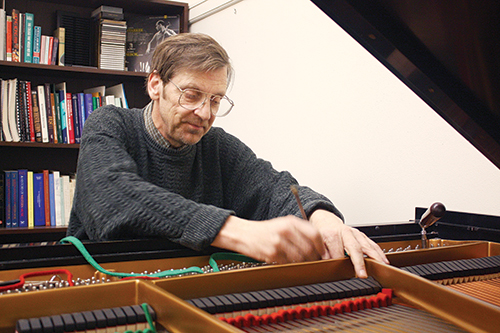
Before the start of every term, Bruce Lindley roams through Lincoln Hall from dark until dawn, usually without speaking to a soul.
He’s a man hardly anyone ever sees on campus. He’s quiet, and he chooses to work at night when there is optimal silence and stillness.
Lindley is a piano tuner, and some in the music department have likened him to a ghost of the night.
“One thing you should understand about piano tuners is that they tend to like very quiet environments,” said Bryan Johanson, the music department chair.
A tall, thin man with a rolling, soft-spoken voice, Lindley is a Linfield College alumnus and has been tuning pianos for nearly four decades.
“It was always a drive I had, another thing that connected me to music,” he said.
Alone in a room with a piano, Lindley opens a 15-pound tool kit and selects a wooden-handled tuning hammer and long bits of licorice-red felt.
He plays a few notes and a few fourths and fifths, then lifts the piano lid and weaves a strip of felt through the golden strings to isolate notes. He adjusts and tests, adjusts and tests, sometimes making adjustments as small as 1/1000th of a pitch change.
“Some pianos you feel that you can get along with better than others,” he said.
Lindley has been known to get already-great-sounding pianos sounding even better with every tuning session. That, he said, is because of perseverance.
“I like to know why a piano is doing what it’s doing,” he said. “I don’t just tune and run.”
Lindley explained that pianos are not tuned purely. A tuner allows a slight give in the purity of certain notes as he tunes up the octaves. This, according to Lindley, is the art of piano tuning—the real difficulty that might not click for some people.
“In high school and college I was called upon to be group tuner. It seemed to be so easy for me,” he recalled. “I could say, ‘That’s flat… sharp… that’s good.’”
Other than some guidance from two piano tuners he befriended, Lindley is entirely self-taught. He also taught himself how to rebuild and repair pianos.
Like all tuners, Lindley worries about his hearing. If he loses it, his work is done. So he wears earmuffs when he is in downtown Portland.
“It decreases some of the ringing I have in my ears, and it helps keep my ears warm, too,” he said.
He warns against iPod earbuds and said he sees more young people than ever with hearing aids. “One kid I talked to said he listens to it all the way up. I said, ‘Doesn’t that hurt?’”
The music department offers classes on musician wellness, which include information about hearing-loss prevention.
Few in the music department know Lindley, and the students who play the pianos he tunes have probably never met him. Those select few who have met him, though, can attest to his kindness and his quiet demeanor.
“He’s a very good one-on-one person, if you know what I mean,” senior music major Travis Chapman said. “And he is very nice.”
When he is needed on campus, Lindley chooses to come from 9 p.m. to 6 a.m.
“The only visits I get are from custodians,” he laughed. “And a [public safety officer] who startled me once when I had sat down for a break and dozed off. He wanted to know who I was and what I was doing here.”
Lindley said roaming the halls of PSU brings back memories of his college days in McMinnville. He thought he wanted to be a performer back then—though he can play the piano, his primary instrument is the trombone—but was steered toward teaching instead.
Looking back, he said he might wish he had pursued performance, but he doesn’t think a performance degree is necessary.
“If you’re going to perform, you need to prepare yourself for it, just show yourself, do some auditioning and go for it.” Whereas a degree might be useful for teaching, performing is its own animal.
Tuning obviously satisfies Lindley, but he never stopped playing trombone: He played in various symphonies for years, and now he plays and records his own music.
“I like Chopin, the symphonies, gospel, and I like jazz a lot, though I don’t seem to have it [in] my bones to play it,” he joked.
You might catch him playing private gigs in Centralia and Chehalis, Wash.
It’s more likely, though, that you will never see him—that he will come and go unseen, one of the myriad people working under the radar to keep this university running.

